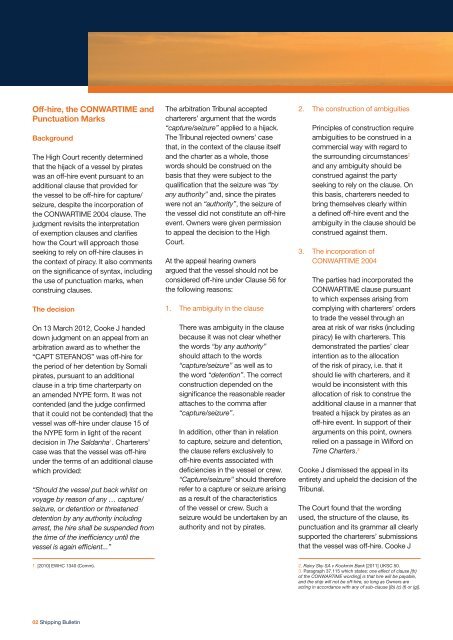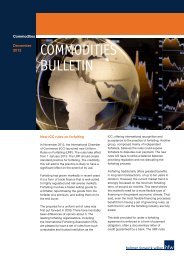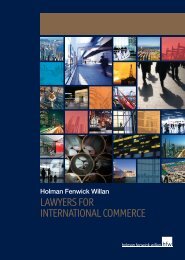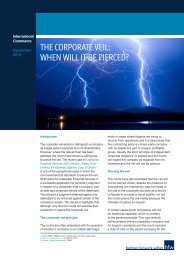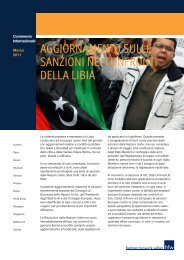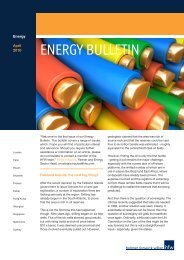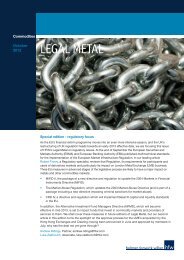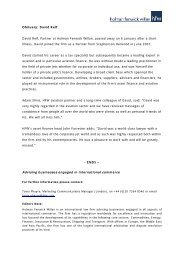Create successful ePaper yourself
Turn your PDF publications into a flip-book with our unique Google optimized e-Paper software.
Off-hire, the CONWARTIME and<br />
Punctuation Marks<br />
Background<br />
The High Court recently determined<br />
that the hijack of a vessel by pirates<br />
was an off-hire event pursuant to an<br />
additional clause that provided for<br />
the vessel to be off-hire for capture/<br />
seizure, despite the incorporation of<br />
the CONWARTIME 2004 clause. The<br />
judgment revisits the interpretation<br />
of exemption clauses and clarifies<br />
how the Court will approach those<br />
seeking to rely on off-hire clauses in<br />
the context of piracy. It also comments<br />
on the significance of syntax, including<br />
the use of punctuation marks, when<br />
construing clauses.<br />
The decision<br />
On 13 March 2012, Cooke J handed<br />
down judgment on an appeal from an<br />
arbitration award as to whether the<br />
“CAPT STEFANOS” was off-hire for<br />
the period of her detention by Somali<br />
pirates, pursuant to an additional<br />
clause in a trip time charterparty on<br />
an amended NYPE form. It was not<br />
contended (and the judge confirmed<br />
that it could not be contended) that the<br />
vessel was off-hire under clause 15 of<br />
the NYPE form in light of the recent<br />
decision in The Saldanha 1 . Charterers’<br />
case was that the vessel was off-hire<br />
under the terms of an additional clause<br />
which provided:<br />
“Should the vessel put back whilst on<br />
voyage by reason of any … capture/<br />
seizure, or detention or threatened<br />
detention by any authority including<br />
arrest, the hire shall be suspended from<br />
the time of the inefficiency until the<br />
vessel is again efficient...”<br />
02 Shipping Bulletin<br />
The arbitration Tribunal accepted<br />
charterers’ argument that the words<br />
“capture/seizure” applied to a hijack.<br />
The Tribunal rejected owners’ case<br />
that, in the context of the clause itself<br />
and the charter as a whole, those<br />
words should be construed on the<br />
basis that they were subject to the<br />
qualification that the seizure was “by<br />
any authority” and, since the pirates<br />
were not an “authority”, the seizure of<br />
the vessel did not constitute an off-hire<br />
event. Owners were given permission<br />
to appeal the decision to the High<br />
Court.<br />
At the appeal hearing owners<br />
argued that the vessel should not be<br />
considered off-hire under Clause 56 for<br />
the following reasons:<br />
1. The ambiguity in the clause<br />
There was ambiguity in the clause<br />
because it was not clear whether<br />
the words “by any authority”<br />
should attach to the words<br />
“capture/seizure” as well as to<br />
the word “detention”. The correct<br />
construction depended on the<br />
significance the reasonable reader<br />
attaches to the comma after<br />
“capture/seizure”.<br />
In addition, other than in relation<br />
to capture, seizure and detention,<br />
the clause refers exclusively to<br />
off-hire events associated with<br />
deficiencies in the vessel or crew.<br />
“Capture/seizure” should therefore<br />
refer to a capture or seizure arising<br />
as a result of the characteristics<br />
of the vessel or crew. Such a<br />
seizure would be undertaken by an<br />
authority and not by pirates.<br />
2. The construction of ambiguities<br />
Principles of construction require<br />
ambiguities to be construed in a<br />
commercial way with regard to<br />
the surrounding circumstances 2<br />
and any ambiguity should be<br />
construed against the party<br />
seeking to rely on the clause. On<br />
this basis, charterers needed to<br />
bring themselves clearly within<br />
a defined off-hire event and the<br />
ambiguity in the clause should be<br />
construed against them.<br />
3. The incorporation of<br />
CONWARTIME 2004<br />
The parties had incorporated the<br />
CONWARTIME clause pursuant<br />
to which expenses arising from<br />
complying with charterers’ orders<br />
to trade the vessel through an<br />
area at risk of war risks (including<br />
piracy) lie with charterers. This<br />
demonstrated the parties’ clear<br />
intention as to the allocation<br />
of the risk of piracy, i.e. that it<br />
should lie with charterers, and it<br />
would be inconsistent with this<br />
allocation of risk to construe the<br />
additional clause in a manner that<br />
treated a hijack by pirates as an<br />
off-hire event. In support of their<br />
arguments on this point, owners<br />
relied on a passage in Wilford on<br />
Time Charters. 3<br />
Cooke J dismissed the appeal in its<br />
entirety and upheld the decision of the<br />
Tribunal.<br />
The Court found that the wording<br />
used, the structure of the clause, its<br />
punctuation and its grammar all clearly<br />
supported the charterers’ submissions<br />
that the vessel was off-hire. Cooke J<br />
1. [2010] EWHC 1340 (Comm). 2. Rainy Sky SA v Kookmin Bank [2011] UKSC 50.<br />
3. Paragraph 37.115 which states: one effect of clause [(h)<br />
of the CONWARTIME wording] is that hire will be payable,<br />
and the ship will not be off-hire, so long as Owners are<br />
acting in accordance with any of sub-clause [(b) (c) (f) or (g)].


